×


We have detected your country as:
Please click here to go to the USA website or select another country from the dropdown list.
by: Janet Aslin, BFP Staff Writer
One morning during my devotional time with the Lord, I was reading in the book of Proverbs and a verse literally jumped off the page. I read, “A man without self-control is like a city broken into and left without walls” (Prov. 25:28 ESV, emphasis added). The image shed a powerful light as I thought about the spiritual fruit of self-control. Lacking this fruit is no small matter. Like many in the world today, I have grown up with an abundance of food and find it difficult to say “no” to sweets or second helpings. Rather than the minor indulgence I had thought it to be, God says this lack of self-control is serious—like a city broken into and without protection.
Sitting there, I pondered, “What can I learn about walls from reading God’s Word? How can I apply the wisdom found in the Bible to my life? Where is the answer He has provided that will allow me to overcome my struggle and gain self-control?” So I began to study the word “wall,” as found in Scripture.

Rudolf Tepfenhart/Shutterstock.com
There are at least twelve Hebrew words that have been translated “wall” in the Tanakh (Gen.–Mal.). While many appear just a single time, three are used predominately. The first is Strong’s H2346, חומה (chowmah) which appears 133 times in the King James Version. More than one hundred times, it is used to refer to the defensive walls of a city, signifying protection from danger.
Chowmah is also used metaphorically, still with the idea of some type of protection. For instance, “The rich man’s wealth is his strong city, and like a high wall in his own esteem” (Prov. 18:11). Another example comes from the account in 1 Samuel 25 which tells us that when David was in the wilderness of Paran, he and his men watched over and protected Nabal’s shepherds. Later David sent his servants to Nabal to request provisions, and Nabal angrily rebuffed them. Alarmed, the servants told Abigail, Nabal’s wife, “But the [David’s] men were very good to us, and we were not hurt, nor did we miss anything as long as we accompanied them, when we were in the fields. They were a wall to us both by night and day, all the time we were with them keeping the sheep” (1 Sam. 25:15–16).
The second Hebrew word translated “wall” is קיר (qiyr), Strong’s H7023. It occurs 66 times, primarily referring to the walls of a building. Less frequently, qiyr can describe an external wall as David writes, “How long will you attack a man? You shall be slain, all of you, like a leaning wall and a tottering fence” (Ps. 62:3) or as mentioned in Isaiah 22:5, the defensive walls of a fortified city.
Finally, we see several noun forms of the root גדר (gadar), Strong’s H1443, which is a verb that means, “to wall up, wall off, close up or build a wall; to surround with a fence or hedge.” These nouns are used to describe the walls of a vineyard (Num. 22:24) or an enclosed area used as a fold for sheep (Num. 32:24). Translated eight times as “wall,” the noun form of gadar appears another eight times as “hedge” and five times refers to “sheepfolds.”
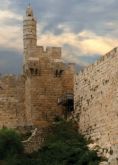
Stavchansky Yakov/Shutterstock.com
Walls serve several purposes: city walls offer protection from an enemy; building walls provide a means of separating areas for different uses, as inside a home; and smaller walls or fences set boundaries. A wall can also provide the vantage point from which to warn of danger in time of war.
There is an understanding of completeness when considering a wall. A wall that is functioning according to its purpose will completely surround the area it is intended to protect, establish the boundaries of or separate.
Each of these purposes can also be looked at from a negative perspective. Prison walls keep the inmates confined during the term of their sentences. Metaphorical walls can be erected between people as the result of cultural or language differences. However, this teaching letter will focus on the protective benefits of walls from a positive, biblical point of view.
Although there are many different places in Scripture which refer to walls, it is not surprising that the word chowmah (wall) is found more often in the book of Nehemiah than in any other book of the Tanakh. Nehemiah is a treasure-trove of wisdom regarding walls, and I believe it contains lessons that can be applied to our own lives today, even though we do not live in cities that require physical walls of protection.
The book opens when Nehemiah, who was in the city of Shushan, received visitors from Jerusalem who brought sad news. “They said to me, ‘The survivors who are left from the captivity in the province are there in great distress and reproach. The wall of Jerusalem is also broken down, and its gates are burned with fire’” (Neh. 1:3). Nehemiah wept and mourned many days when he heard that Jerusalem was defenseless.
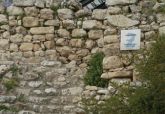
Remnants of Nehemiah’s wall Photo by Daniel Johnson
After the period of mourning, Nehemiah, who was cupbearer to King Artaxerxes, took action: he requested and received permission to return to Jerusalem and rebuild the walls. Equipped with letters from the king authorizing the journey, giving him timber from the king’s forest and a small escort, Nehemiah arrived in Jerusalem. Once there, he was discreet, and having already encountered the displeasure of the local authorities, he did not tell anyone of his intent to rebuild. The first thing he did was secretly inspect the city’s walls and gates by night. How important it is to accurately know the scope of the job before making specific plans to complete the task. We must also understand that there will be opposition to the pursuit of God’s plan.
The land of Judah to which Nehemiah returned had been conquered by Babylonians, its capital city of Jerusalem destroyed, and the surrounding countryside filled with a mixture of Jewish and non-Israelite population. Charles Pfeiffer, in his book Old Testament History, writes, “Unlike the Assyrians who repopulated the Northern Kingdom after its fall in 722 BC (2 Kings 17:24), the Babylonians did not make it a policy to repopulate areas from which captives had been taken. Instead, the land was gradually occupied by neighboring tribes…Before the return of the exiles from Babylonia, Judah was dominated by alien peoples with the descendants of the Jewish population that had not been deported. The area occupied by the Jews who returned following the decree of Cyrus was not much more than Jerusalem and its suburbs.” Nehemiah had returned to enemy territory, surrounded by people who did not want to see the walls of Jerusalem rebuilt.
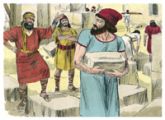
Distant Shores Media/Sweet Publishing
The opposition, which came in varying forms, was led by Sanballat, the governor of Samaria and several others including Tobiah, an Ammonite, and Gershom, most likely from an Arab tribe. First they tried verbal taunts, mockery and derision. “And he [Sanballat] spoke before his brethren and the army of Samaria, and said, ‘What are these feeble Jews doing? Will they fortify themselves? Will they offer sacrifices? Will they complete it in a day? Will they revive the stones from the heaps of rubbish—stones that are burned?’” (Neh. 4:2). Undeterred, Nehemiah and the Jewish people simply cried out to the Lord and continued working on the wall.
When their first attempt to stop the Jews failed, Sanballat and his companions stepped up their attack, taking it to the next level—physical threats. “Now it happened, when Sanballat, Tobiah, the Arabs, the Ammonites, and the Ashdodites heard that the walls of Jerusalem were being restored and the gaps were beginning to be closed, that they became very angry, and all of them conspired together to come and attack Jerusalem and create confusion” (Neh. 4:7–8). Again, Nehemiah turned to the Lord in prayer and also armed the workmen as a precautionary measure. Pfeiffer writes, “The Samaritans and their allies did not make an open attack, but they posed a constant threat and worked serious hardships on the Jews.”
Having failed at their attempts to intimidate those working on the wall, Sanballat now tried a new tactic—he went directly after their leader. Four times they invited Nehemiah to come down for a “meeting” and four times he refused, knowing that their intentions were harmful. The fifth attempt came in the form of an open letter, falsely accusing Nehemiah of rebellion against Persia. “In it was written: It is reported among the nations, and Geshem says, that you and the Jews plan to rebel; therefore, according to these rumors, you are rebuilding the wall, that you may be their king” (Neh. 6:6). Nehemiah flatly denied this accusation, “Then I sent to him, saying, ‘No such things as you say are being done, but you invent them in your own heart’” (Neh. 6:8). In their final attempt, they tried to trick Nehemiah by hiring the prophet Shemaiah to lure him into the Temple. Nehemiah refused to go, giving two reasons: “It is wrong for the leader of the people to go into hiding; and since he was not a Kohen [priest], he was forbidden to enter the Sanctuary” (The Tanach, Stone Edition).
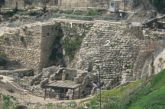
Nehemiah’s wall adjoining the stepped stone structure Photo by Daniel Johnson
Despite the nearly constant disruptions and threats against Nehemiah, the leader, and those who were rebuilding the wall, it was completed and the city of Jerusalem was once again securely protected from her enemies.
Walls serve the purpose of protection, but they also set boundaries and provide a means of separation from whatever is outside. After the destruction of the Temple and the Babylonian exile, many of the Jewish people who remained in Judah had intermarried with non-Jews. “The problem of intermarriage was a vexing one…He [Nehemiah] reminded them that even godly Solomon was led astray by his foreign wives (Neh. 13:25–27). Eliashib’s [the High Priest] grandson, who had married the daughter of Sanballat, was a notorious offender and Nehemiah banished him from Jerusalem (Neh. 13:28)” (Pfeiffer, Old Testament History).
Although Jerusalem’s physical wall served to protect her from human enemies, it can also be seen as a visible representation of the boundary between God’s people and the world. In addition to leading the effort to rebuild the wall, Nehemiah instituted religious reforms. After a public reading of the Mosaic Law led the Israelites to recognition of their sin, to fasting and repentance, a written covenant (also known as the Code of Nehemiah) was drafted and signed by members of the community. In this covenant they promised to do seven things: “(1) to avoid mixed marriages with the peoples of the land; (2) not to buy from foreigners on Sabbaths and holy days; (3) to observe the sabbatical year; (4) to pay a new annual third shekel temple tax; (5) to supply offerings for the services and wood for the Temple altar; (6) to supply the first fruits, firstlings, tithes and other contributions to the Temple; (7) to bring the tithes due to the priests and Levites to local storehouses” (Neh. 9:38, 10:1–40 and www.jewishvirtuallibrary.org). God’s people were clearly separating themselves from the surrounding cultures and acknowledging His Law.
Thus, in concluding our consideration of the rebuilding of Jerusalem’s walls, we can see that the three purposes of walls that were identified are evident in the book of Nehemiah. Walls protected the city and they separated and set apart its inhabitants by establishing clear boundaries between God’s chosen people and pagan cultures.
As you may recall, I began this search of Scripture in order to learn how a wall might help me attain the spiritual fruit of self-control. That we live in a world which is opposed to God should be clearly evident. Just like the ancient city that needed protection from its enemies, individuals today need protection from the daily onslaught of temptations that are a part of life in a fallen world.
Four things come to mind when I consider my individual “wall” of protection. I would like to propose that God has provided them as components of a whole and not individual “walls.” Each is important and to leave one out would weaken the entire structure.
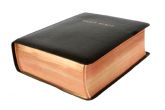
Panaroid/ iStockphoto.com
The first component is God’s Word. There are many reasons for reading Scripture, but since we are looking at the concept of walls and protection, our focus narrows a bit. For many of us, the following verse is a comfort even though it promises to discipline us should we need correction. “All Scripture is given by inspiration of God, and is profitable for doctrine, for reproof, for correction, for instruction in righteousness, that the man of God may be complete, thoroughly equipped for every good work” (2 Tim. 3:16–17). God’s Word is able to set clear “walls” or boundaries for believers, establishing how we ought to live our lives.
The Hebraic roots of our faith also demonstrate how Scripture is able to keep and protect us. In the book Judaism, we read, “It [the Torah] is no impossible set of demands meant for angels or a very few men of superior piety. Its wisdom and ordinances are the way of holiness for all men, even the most ordinary among them. Through obedience we resist the temptations that come to us on each and every day—so Rashi, Rabbi Solomon ben Isaac (1040–1105), the classic commentator on the Bible and Talmud explained.”
The second component is prayer or our communication with God during which we acknowledge that He is almighty and we are but frail humans. It could mean crying out to the Lord to save us as Nehemiah did when he and the workmen were being taunted by Sanballat, “Hear, O our God, for we are despised; turn their reproach on their own heads, and give them as plunder to a land of captivity!” (Neh. 4:4). Perhaps we’ve become aware of a sin and tell God about it as David did when he prayed, “I acknowledged my sin to You, and my iniquity I have not hidden. I said, ‘I will confess my transgressions to the LORD,’ and You forgave the iniquity of my sin” (Ps. 32:5). Or maybe we just cry out, “Abba, Father” when we feel alone and need to be reminded of the protection our relationship with our heavenly Father brings.
The fellowship of believers, and within that fellowship our personal accountability to one or two mature believers, is the third component. Just as prayer cultivates our relationship with God, we must also be in healthy relationships with other believers—to encourage and strengthen them and allow them to do the same for us. “And let us consider one another in order to stir up love and good works, not forsaking the assembling of ourselves together, as is the manner of some, but exhorting one another, and so much the more as you see the Day approaching” (Heb. 10:24–25).

jgroup/iStockphoto.com
Finally, praise and worship are powerful weapons that can be used to build, rebuild or sustain our “wall” of protection. Through praise we acknowledge who God is and our dependence on Him. The book of Psalms is rich with examples of the songs of praise written by King David and others. It is a wonderful place to begin, and from there move into praising God for His acts of mercy and grace toward us today.
This group of four components is not meant to be an exhaustive list. As you wait on the Lord, may He reveal other ways in which you can build your “wall” of protection, your fence or boundary from the incursions of the outside world.
Now that we’ve identified the important components of our “walls,” what are the lessons we can learn from Nehemiah’s account?
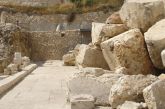
Photo by Ina Lackert
First, we need to be aware of our wall’s condition—it can be broken down and destroyed by the enemy. If we neglect our reading of Scripture, if we allow our prayer life to become dull and routine, if we stop attending a fellowship regularly, if we forget to give praise to the One who is worthy of the highest honor and praises—these actions can, little by little, break down the stones in our protective wall.
Once we have allowed the walls to be damaged, it is hard work to repair them. During the rebuilding process we can expect distractions and discouragement to come in many different forms. We will encounter various kinds of harassment as we shore up the damaged places. It may come from strangers, friends or even from within ourselves. Perseverance and a steadfast commitment to trust in the Lord are essential if we are to succeed. We must make a conscious choice to set our minds on God, to seek after Him and to be obedient in all things, even the little ones.
Even if it is not broken down, diligence is required to maintain our boundary wall of protection. “I went by the field of the lazy man, and by the vineyard of the man devoid of understanding; and there it was, all overgrown with thorns; its surface was covered with nettles; its stone wall was broken down” (Prov. 24:30–31). We must also understand that we are at war and be prepared to fight when necessary. The workmen rebuilding the wall in Nehemiah’s time “loaded themselves so that with one hand they worked at construction, and with the other held a weapon” (Neh. 4:17); and just so, we also must be prepared to fight.
When our walls are in good condition, we will be kept pure and separate from the world by God’s power. If there are areas in our lives where we are in sin or rebellion, that will become very clear as the wall is a boundary line. Once Jerusalem’s walls were rebuilt, Nehemiah called for a public reading of the Law. This, in turn, led to the recognition by the people of their sin and their need for repentance.
Psalm 51 is a beautiful example of the restoration of purity and right relationship in King David’s life. His “wall” of protection had been breached by his sin of adultery with Bathsheba and the subsequent order to have her husband, Uriah, sent to the front line of the battle where he was killed (2 Sam. 11). When God sent Nathan, the prophet, to confront David (2 Sam. 12:1–15), he confessed his sin and cried out in repentance.
“Have mercy upon me, O God, according to Your lovingkindness; according to the multitude of Your tender mercies, blot out my transgressions. Wash me thoroughly from my iniquity, and cleanse me from my sin” (Ps. 51:1–2). Essentially he said, “O Lord, I see the breach in the wall; an opening that was caused by my sin; a place where my enemy can come in to steal from me.”
“Create in me a clean heart, O God, and renew a steadfast spirit within me. Do not cast me away from Your presence, and do not take Your Holy Spirit from me. Restore to me the joy of Your salvation, and uphold me by Your generous Spirit” (Ps 51:10–12). David recognized that the breach in his “wall” was also a break in his relationship with God, something he valued more than anything else on earth. In repentance, he cried out to the Lord to be cleansed and restored.
“Then I will teach transgressors Your ways, and sinners shall be converted to You” (Ps. 51:13). Once he had been restored, his wall of protection again complete and whole, David’s desire was to tell others of the Lord’s mercy and love, His willingness to forgive and repair the damage done by sin. Interestingly, toward the end of Psalm 51, David mentioned the walls of Jerusalem as he interceded, “Do good in Your good pleasure to Zion; build the walls of Jerusalem” (v. 18); David recognized the importance of God’s protection of His people.

Rudolf Tepfenhart/Shutterstock.com
I began this quest with a Scripture—“A man without self-control is like a city broken into and left without walls” (Prov. 25:28 ESV). Through our examination of Nehemiah and other portions of Scripture, we can see the importance of having and maintaining a protective wall. God has made provision for us to live under His protection, as safely as if we were living in a fortified, walled city of ancient times. Our daily actions and choices have such an effect on the condition of our “wall.” Sometimes I have made the error of thinking, there are big sins and there are little sins. Surely God will overlook my small sin of overeating occasionally. However, any act of disobedience weakens my “wall” of protection, which is God’s gift to me. May we all be diligent in building and maintaining those protective walls.
Hertzberg, Arthur, ed. Judaism. London: Prentice-Hall International, 1961.
“Nehemiah’s Efforts at Reconstructing and Fortifying Jerusalem”; “Intrigues against
Nehemiah,” https://www.jewishvirtuallibrary.org//jsource/judaica
/ejud_0002_0006_0_06217.html
Pfeiffer, Charles F. Old Testament History. Grand Rapids, MI: Baker Book House, 1973.
Scherman, Rabbi Nosson, ed. Tanach (Artscroll Series). New York: Mesorah
Publications,Ltd., 1996.
Strong, J. Strong’s Exhaustive Concordance of the Bible. Peabody, Mass: Hendrickson
Publishers, 2009.
www.blueletterbible.org
All logos and trademarks in this site are property of their respective owner. All other materials are property of Bridges for Peace. Copyright © 2024.
Website Site Design by J-Town Internet Services Ltd. - Based in Jerusalem and Serving the World.